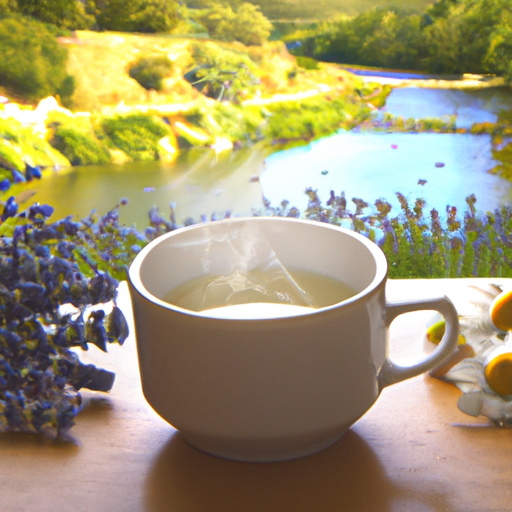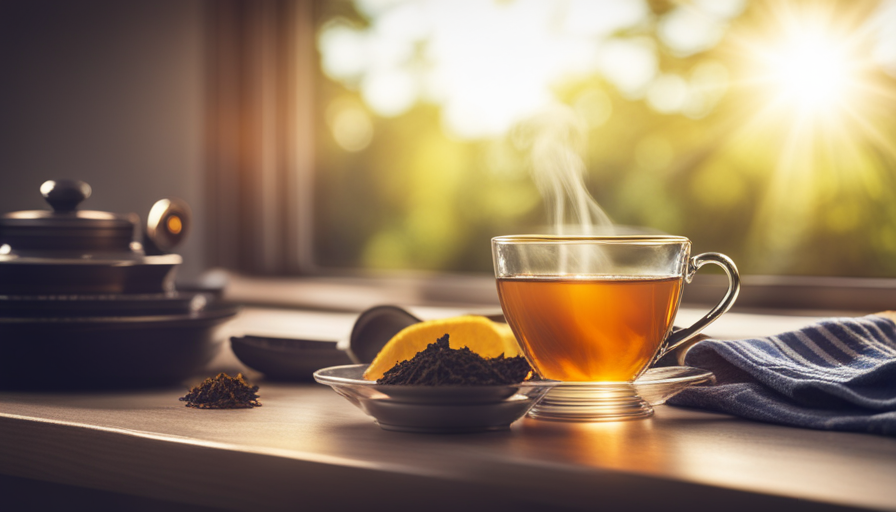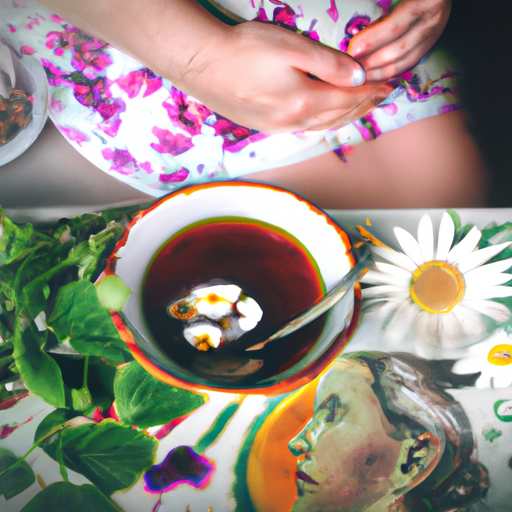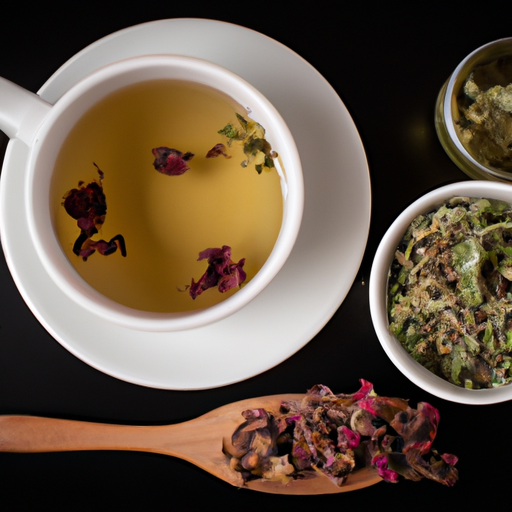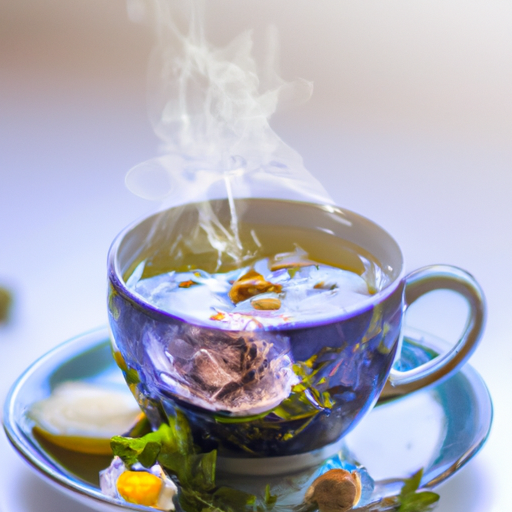Are you tired of feeling anxious all the time? Do you crave peace and tranquility? Don’t worry, my anxious friend, because the solution to your problems might just be a simple cup of herbal tea.
Yes, you heard me right – tea! But not just any tea, my dear reader. I am here to guide you through the labyrinth of herbal teas and help you find the one that will soothe your frazzled nerves and restore your sense of inner peace.
Now, before you dismiss this as mere quackery, let me assure you that the calming properties of herbal teas have been backed by centuries of tradition and, more importantly, scientific research. These teas are not just a placebo; they contain active compounds that have been proven to have a calming effect on the nervous system.
So, without further ado, let us embark on a journey through the world of herbal teas to discover which one is best suited to calm your nerves.
From the delicate and floral chamomile to the invigorating and minty peppermint, we will explore the properties and benefits of each tea, guiding you towards the one that will bring you the serenity you seek.
So, grab your favorite mug, settle into a cozy chair, and let’s begin this tea-infused adventure together.
Key Takeaways
- Chamomile tea is backed by scientific research and has calming properties that can reduce anxiety, promote relaxation, aid digestion, and improve sleep.
- Lavender tea is another herbal tea that can help calm nerves as it reduces anxiety, promotes tranquility, and has sedative properties.
- Peppermint tea is known to reduce stress and anxiety, improve digestion, relieve headaches, boost the immune system, and promote relaxation and sleep.
- Lemon balm tea is beneficial for calming nerves as it reduces anxiety and stress, promotes relaxation, and improves sleep quality.
Chamomile Tea
If you’re looking for a herbal tea to calm your nerves, chamomile tea is the perfect choice for you! Chamomile tea has been used for centuries for its calming properties and is known for its many benefits.
Not only does it help to reduce anxiety and promote relaxation, but it also aids in digestion and promotes better sleep. To brew chamomile tea effectively, start by boiling water and then adding the chamomile tea bags or loose chamomile flowers. Let it steep for about 5 minutes to release all the beneficial compounds. You can add a touch of honey or lemon to enhance the flavor.
With its soothing aroma and gentle taste, chamomile tea is a wonderful way to wind down and ease your nerves.
Speaking of calming teas, let’s move on to the next one – lavender tea.
Lavender Tea
To relax and soothe your mind, try sipping on a cup of lavender tea. It’s known for its ability to reduce anxiety and promote a sense of tranquility. Lavender tea has long been used for its calming effects, making it a popular herbal remedy for sleep and relaxation. The natural compounds found in lavender have been found to have sedative properties, helping to induce a state of relaxation and ease tension in the body.
To make your own lavender tea at home, simply steep a teaspoon of dried lavender flowers in hot water for about 10 minutes. You can also add a touch of honey or lemon for added flavor.
Transitioning into the next section, let’s explore the benefits of peppermint tea for digestive health.
Peppermint Tea
Indulge in a steaming cup of peppermint tea and let its refreshing aroma and invigorating flavor awaken your senses, while providing relief for your digestive woes. Peppermint tea has numerous benefits that can help calm your nerves. Here are five benefits of peppermint tea:
-
Reduces stress and anxiety: Peppermint tea contains menthol, which has a calming effect on the body and can help reduce stress and anxiety.
-
Improves digestion: Peppermint tea has been used for centuries to soothe digestive issues such as bloating, indigestion, and stomach cramps.
-
Relieves headaches: The menthol in peppermint tea has analgesic properties that can help relieve tension headaches and migraines.
-
Boosts immune system: Peppermint tea is rich in antioxidants, which can strengthen your immune system and protect against illness.
-
Promotes relaxation and sleep: Drinking a cup of peppermint tea before bed can help you relax and improve the quality of your sleep.
To make peppermint tea at home, simply steep fresh or dried peppermint leaves in boiling water for about 5-10 minutes. Strain the leaves and enjoy!
Now, let’s explore the benefits of lemon balm tea.
Lemon Balm Tea
Lemon balm tea, with its delightful citrusy flavor, offers a host of benefits that can invigorate your senses and promote overall well-being. The benefits of lemon balm tea are numerous. It’s been shown to reduce anxiety and stress, promote relaxation, and improve sleep quality. This herbal tea contains compounds that have a calming effect on the nervous system, helping to soothe frazzled nerves and ease tension.
To make lemon balm tea, simply steep a handful of fresh lemon balm leaves in hot water for about 5 minutes. You can also add a slice of lemon or a teaspoon of honey for added flavor.
Now, let’s transition to the next section about valerian root tea, which is another herbal tea that’s known for its calming properties.
Valerian Root Tea
Valerian root tea, with its soothing essence, transports you to a state of tranquil bliss. This herbal tea has been used for centuries to calm nerves and promote relaxation.
Here are some benefits of valerian root tea:
- Promotes better sleep: Valerian root has been shown to help improve sleep quality and reduce the time it takes to fall asleep.
- Reduces anxiety: The compounds in valerian root have a calming effect on the nervous system, which can help alleviate feelings of anxiety and stress.
- Relieves muscle tension: Valerian root tea can help relax tense muscles and reduce muscle pain or discomfort.
When making valerian root tea at home, start by steeping one teaspoon of dried valerian root in a cup of hot water for about 10 minutes. Strain the tea and enjoy before bedtime or during times of stress.
It’s important to note that valerian root may cause drowsiness, so avoid driving or operating heavy machinery after consuming this tea.
Now let’s delve into the benefits and preparation of passionflower tea.
Passionflower Tea
After exploring the benefits of Valerian Root Tea, let’s dive into another herbal remedy for calming nerves: Passionflower Tea. As someone who values natural remedies, I have found passionflower tea to be a soothing and effective option. Passionflower has been used for centuries, particularly in traditional medicine, for its calming properties. It is believed to promote relaxation and reduce anxiety. Research suggests that passionflower tea may increase levels of gamma-aminobutyric acid (GABA) in the brain, a chemical that helps regulate mood and promote relaxation. However, it’s important to note that passionflower tea may cause drowsiness, so it’s best to avoid driving or operating heavy machinery after consuming it. Additionally, some individuals may experience mild side effects such as dizziness or gastrointestinal discomfort. As we move forward, let’s explore another herbal tea that can help with stress and anxiety: Ashwagandha Tea.
Ashwagandha Tea
Ashwagandha tea is a powerful herbal remedy that can help reduce stress and anxiety levels. It promotes a sense of calmness and emotional well-being, making it an excellent choice for those seeking natural ways to soothe their nerves.
As someone who’s knowledgeable about holistic healing and evidence-based practices, I highly recommend incorporating ashwagandha tea into your daily routine to experience its numerous benefits for your overall mental health.
Helps reduce stress and anxiety levels
Feeling overwhelmed and stressed? Try sipping on a soothing cup of herbal tea to help calm your nerves and ease your anxiety. Herbal teas have been used for centuries as natural remedies for anxiety, providing numerous benefits for our overall well-being.
Here are a few reasons why herbal tea is beneficial for reducing stress and anxiety levels:
-
Chamomile tea: Known for its calming properties, chamomile tea can help relax your mind and body, promoting a sense of tranquility.
-
Lavender tea: Lavender has long been associated with relaxation and can help reduce anxiety symptoms, allowing you to feel more at ease.
-
Lemon balm tea: This herbal tea is known for its ability to reduce stress and improve mood, helping you find a sense of calmness.
-
Passionflower tea: Passionflower has been used to treat anxiety for centuries, promoting a sense of emotional well-being.
By incorporating these herbal teas into your daily routine, you can experience a greater sense of calmness and emotional well-being.
Promotes a sense of calmness and emotional well-being
When it comes to finding a natural remedy to reduce stress and anxiety levels, herbal tea is a fantastic option. Not only does it provide a soothing and calming experience, but it also promotes a sense of calmness and emotional well-being.
Herbal teas are known for their ability to relax the mind and body, helping to alleviate feelings of tension and promote a more peaceful state of being. These teas contain various beneficial compounds, such as chamomile, lavender, and lemon balm, which have been shown to have a positive impact on mental health.
By incorporating herbal tea into your daily routine, you can enjoy the benefits of relaxation and improved emotional well-being. So, why not indulge in a warm cup of herbal tea and let its natural goodness work its magic on your mind and body?
Frequently Asked Questions
Are there any potential side effects or interactions to be aware of when consuming Valerian Root Tea for calming nerves?
Are there potential side effects or interactions to be aware of when consuming valerian root tea? It is important to note that valerian root tea may cause drowsiness and interact with certain medications.
Can drinking Lemon Balm Tea help with symptoms of anxiety or stress?
Drinking lemon balm tea can help alleviate symptoms of anxiety or stress. Lemon balm tea is known for its anxiety-relieving benefits, making it a great natural remedy for those seeking relief.
How does Passionflower Tea work to calm nerves and promote relaxation?
Passionflower tea is known for its calming effects on the nervous system. It contains compounds that increase levels of GABA in the brain, promoting relaxation and reducing anxiety. To make it at home, steep dried passionflower leaves in hot water for 10-15 minutes.
What is the recommended dosage of Ashwagandha Tea for reducing anxiety and stress?
I recommend a dosage of 1-2 cups of ashwagandha tea daily for reducing anxiety and stress. It is important to note that valerian root tea may cause potential side effects such as drowsiness and headaches.
Are there any specific precautions to take when preparing and consuming Lavender Tea for its calming properties?
When preparing lavender tea, it’s important to use high-quality dried lavender flowers. Consuming lavender tea can have numerous benefits for relaxation, such as reducing anxiety and promoting better sleep.
Conclusion
In conclusion, incorporating herbal teas into your daily routine can be a great way to calm nerves and promote relaxation. Chamomile tea, known for its calming properties, can help reduce anxiety and improve sleep quality. Lavender tea has also been found to have a soothing effect on the nervous system, reducing stress and promoting a sense of calm.
Additionally, lemon balm tea and passionflower tea have been shown to reduce anxiety and promote feelings of relaxation. One interesting statistic is that over 1 in 4 adults in the United States have reported using herbal remedies for anxiety and stress management. This shows that many individuals are turning to natural solutions to support their mental well-being.

